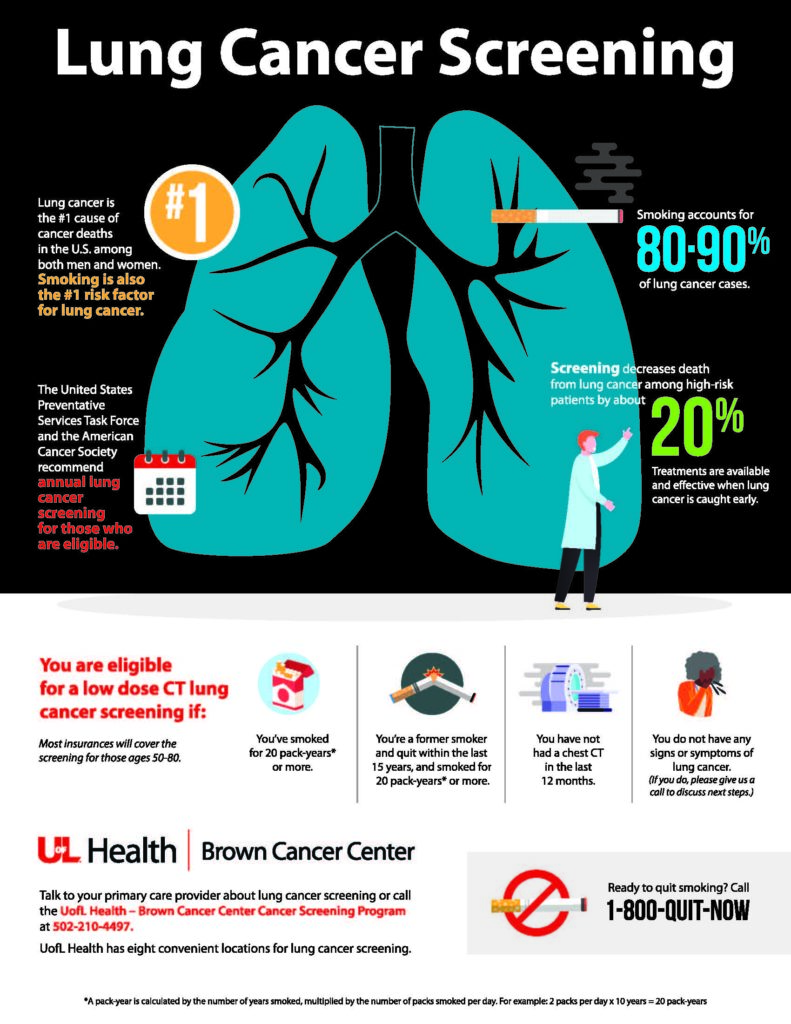If You’ve Been Diagnosed With Lung Cancer…
UofL Health – Brown Cancer Center’s Multidisciplinary Lung Cancer Clinic is home to a renowned group of lung cancer specialists. Our physicians originate and participate in many clinical trials so our patients have access to promising new therapies before they are available elsewhere, including cell-based immunotherapy trials such as tumor-infiltrating lymphocytes (TILs). If a patient is diagnosed with lung cancer, call 502-562-HOPE (4673) to make a referral and schedule an appointment.
To determine eligibility for a low-dose CT lung cancer screening, call Brown Cancer Center's Lung Screening Program at 502-210-4497.
Screenings are available at the following UofL Health locations:
- UofL Health – UofL Hospital
- UofL Health – Jewish Hospital
- UofL Health – Mary & Elizabeth Hospital
- UofL Health – Shelbyville Hospital
- UofL Health – South Hospital
- UofL Health – Medical Center East
- UofL Health – Medical Center Northeast
- UofL Health – Medical Center Southwest
Schedule a Low-Dose CT Lung Cancer Screening
Early Detection Saves Lives
Kentucky has the highest incidence rate of lung cancer in the United States, with about 90 percent of lung cancers caused by smoking. Lung cancer screening allows for early detection when cancer is most treatable and can increase the chance of survival by 50 percent. With recent advances in cancer treatment, lung cancer is no longer considered a death sentence when it’s caught and treated early enough. A lung cancer screening is safe, effective and could save a life.
Criteria for Low-Dose CT Lung Cancer Screening
- Heavy smoker or formerly a heavy smoker (defined by 20 pack-years*)
- If a former smoker must have quit smoking within the last 15 years and smoked more than 20 pack-years
- Most insurances will cover those ages 50-80
- Must not have had a chest CT in the last 12 months (if the patient has had a CTA chest in the last 12 months, they could still have the screening chest CT)
- Has NO signs or symptoms of lung cancer
*A pack-year is calculated by the number of years smoked, multiplied by the number of packs smoked per day. For example: Smoked for 10 years x 2 packs per day = 20 pack-years.
If eligible or for assistance determining eligibility, call Brown Cancer Center's Lung Screening Program at 502-210-4497.
Screening Guidelines
The USPSTF recommends annual screening for lung cancer with low-dose computed tomography (LDCT) in adults aged 50 to 80 years who have a 20-pack-year smoking history and currently smoke or have quit within the past 15 years.
Screening should be discontinued once a person has not smoked for 15 years or develops a health problem that substantially limits life expectancy or the ability or willingness to have curative lung surgery.

For Patients
Patients should talk with their doctor to determine eligibility. If eligible, the physician will write an order for the screening. Brown Cancer Center's Lung Screening Program can also help determine eligibility and schedule the screening -- call 502-210-4497.
Lung Cancer Screening Risks and Benefits
The following information regarding the risks and benefits of having a low-dose CT lung screening may be helpful for you in making a decision to screen.
- A chest CT scan can detect pulmonary nodules which may be an early sign of lung cancer.
- Annual screening is recommended in high-risk individuals from ages 50 to 80.
- This screening will show if a pulmonary nodule is present, but it alone cannot determine if the nodule is malignant or benign. This may require further follow-up with a physician. This could be your primary care provider or this service may be provided by our multidisciplinary team.
- Additional Testing: Detecting a nodule may require more CT scans or surgical procedures for further evaluation. Lung screening may also lead to the detection of other unrelated diseases. This is an additional benefit of low-dose CT scanning for lung cancer; however, it may lead to additional testing, treatment and cost. If you are opposed to these, you should reconsider being screened.
- False-Positive Results: There is, approximately, a 25 percent chance that a nodule will be detected on a screening CT scan in a high-risk individual. Most nodules are benign.
- Radiation Exposure: A low-dose CT scan of the chest will expose you to about the same level of radiation as a mammogram.
- Emotional Stress: Some individuals may experience anxiety from finding a nodule and any associated follow-up.
- You should follow up with your physician regarding the results of the screening.
If you have any concerns or questions regarding lung cancer screening, please be sure to discuss this with your primary care provider.
For Referring Providers
Providers should follow CMS Guidelines to refer patients to UofL Health for a low-dose CT lung cancer screening.
- A lung cancer screening counseling and shared decision-making visit should occur before referral and document the following:
- Eligibility includes age, absence of signs/symptoms of lung cancer, specific pack-year calculation, and if a former smoker, the number of years since quitting.
- Shared decision-making includes benefits and harms of screening, follow-up diagnostic testing, over-diagnosis, false-positive rate, and total radiation exposure.
- Counseling on the importance of annual screening, the impact of comorbidities, and ability/willingness to undergo diagnosis and treatment
- Counseling on smoking cessation and tobacco cessation interventions, or if a former smoker, the importance of maintaining smoking abstinence
- Furnish a written order for low-dose CT lung cancer screening
For additional information, call Brown Cancer Center's Lung Screening Program at 502-210-4497.



